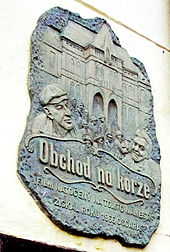The shop on the main street
| Movie | |
|---|---|
| German title | The shop on the main street The shop on the parade |
| Original title | Obchod na korze |
| Country of production | ČSSR |
| original language | Slovak |
| Publishing year | 1965 |
| length | 128 minutes |
| Rod | |
| Director |
Ján Kadár , Elmar Klos |
| script | Ján Kadár, Elmar Klos |
| production |
Miloš Brož Jaromír Lukáš |
| music | Zdeněk Liška |
| camera | Vladimír Novotný |
| cut |
Diana Heringová , Jaromír Janáček |
| occupation | |
| |
The store in the main street (original title Obchod na korze ) is a Czechoslovak film by Ján Kadár and Elmar Klos from 1965, which also became known under the German title Der Laden auf dem Korso . The script by Kadár and Klos was based on the story of the same name by Ladislav Grosman .
The film has won several awards, including the Oscar for best foreign language film .
action
In the times of the Slovak state , the poor and apolitical carpenter Tono Brtko was appointed " Aryan trustee " of a small shop on the main street by his brother-in-law Marcus Kolkotský, who is the city guide of the Hlinka Guard . His greedy wife Evelyna is blinded by the potential profit from the sales, while Tono soon finds out that the business, which belongs to the deaf and reclusive old widow Rozalie Lautmann, is bankrupt and only survives thanks to the financial support given to the old woman the Jewish community receives. Tono becomes the more or less involuntary helper of Mrs. Lautmann, supports her in the business, repairs her furniture, while on the other hand he pretends to his own wife that he already earns money from the shop. The indifferent Tono is also induced by regular money transfers from the Jewish community to behave reasonably decently.
When the Jews are to be deported from the city by the fascists, Tono decides to help the widow. The old lady is initially not at all aware of the danger she is in and only slowly realizes that Tono wants to help her. When drunk, fears are aroused in the carpenter that he might be exposed as her accomplice. In his ambivalence, he initially wants to extradite Ms. Lautmann, but then thinks of a better one. When she finally understands that it is about the deportation of the Jews, she panics for fear of a pogrom . In his fear of being discovered through her behavior, he forcibly pushes the old woman into a storage room, in which she falls to her death. When Tono discovers this, he hangs himself in the shop.

Awards
The film has won several awards and received the Oscar for best foreign language film at the 1966 Academy Awards . Ida Kamińska was also nominated for the Oscar for best leading actress at the following Academy Awards in 1967 and, like Jozef Króner, also received a special award for her acting at the Cannes International Film Festival in 1965. The film was also nominated for the Palme d' Or in the “Best Feature Film” category at the Festival . In 1967 Ida Kamińska was also nominated for the Golden Globe Award for best actress in a drama .
The film also won the Kansas City Film Critics Circle Award (1967) and the New York Film Critics Circle Award in the “Best Foreign Language Film” category (1966) and the Audience Award at the Pilsen Film Festival in 1968.
criticism
"An impressive film that thrives on the great performance of the main actors Króner and Kamińska and on the stylistic consistency of a realistic staging that only loses intensity in a few dream sequences."
"A committed social study with outstanding actor performances and convincing description of the milieu."
“Unfortunately, this is always a topical subject in a masterly design: Totalitarian systems can rely on the cooperation of decent people, because excessive power kills the 'average conscience'. Recommended as a reminder and warning. "
Web links
- The shop in the main street in the Internet Movie Database (English)
Individual evidence
- ↑ RECLAMS FILMführer, p. 407, 7th edition 1987, ISBN 3-15-010205-7
- ↑ rororo-Taschenbuch No. 6322 (1988), p. 1292
- ↑ Critique No. 196/1966, Evangelischer Presseverband München, p. 373